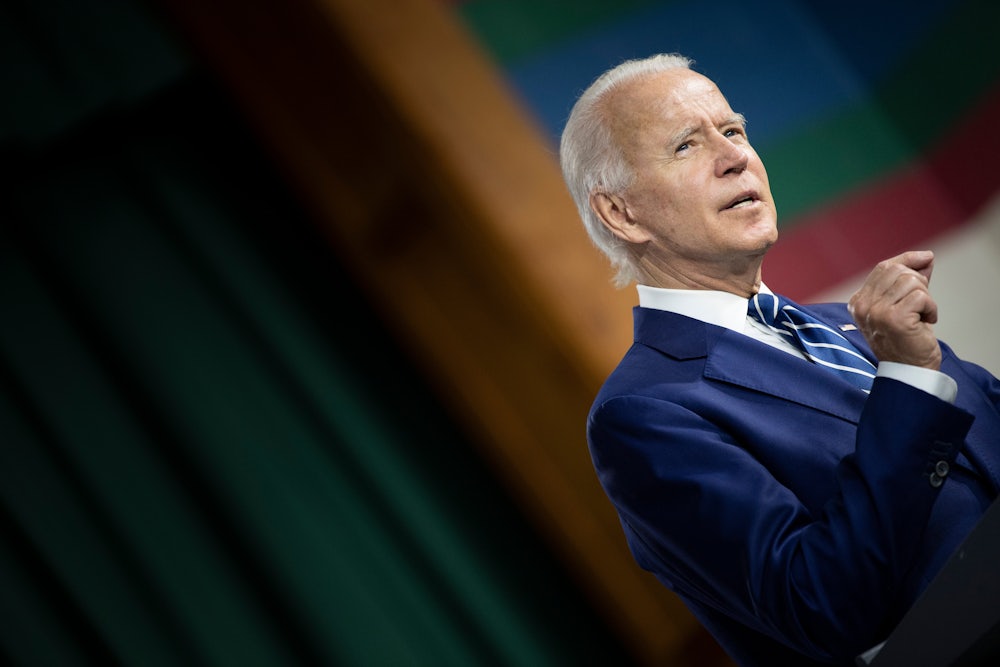Given the fact that we are in what we hope are the latter days of a global pandemic that arrived on these shores during a Democratic presidential primary that was all but defined by vigorous intraparty debates over Medicare for All and the future of health care reform, you wouldn’t be a fool to imagine that the issue might be a priority for President Joe Biden. But now that the administration has released its long-discussed American Families Plan, which has broadly united the idea of “care” with “infrastructure” on numerous fronts, it’s clear that Biden isn’t willing to go big on health care.
The $1.8 trillion plan, details of which were released Wednesday morning, calls for $200 billion in additional Affordable Care Act subsidies. It does not propose lowering Medicare’s eligibility age or expanding Medicare benefits. It appears that Biden isn’t up for a fight with the health insurance lobby. But now he may have a fight within his ranks in Congress: Senator Bernie Sanders told reporters that the two Medicare provisions will be in the bill, “if I have anything to say about it.”
Sanders is among an ideologically mixed group of 17 senators and over 80 representatives who back an expansion of Medicare over an expansion of ACA subsidies. Biden was even on board with the idea as recently as November, when he vowed to lower the eligibility age from 65 to 60. And why wouldn’t he support it? After winning back the White House and the Senate, Democrats are in a position to achieve the greatest expansion of Medicare since its enactment. Not only is the program wildly popular with the public, relative to its for-profit peers as well as the ACA writ large, it’s also more cost-efficient. With the right approach, an expansion would represent a significant incremental step toward single-payer health care and provide a measurable benefit to a vital political constituency in the process.
Implemented in 1965 as part of President Lyndon Johnson’s “Great Society” program, Medicare is, for many Americans, the closest available referent to a universal single-payer health care system (hence its popularity as a slogan to evoke legislation for the latter). Paid for by a combination of payroll taxes, general revenue, and very low premiums, Medicare covers nearly all Americans age 65 and over—a largely nonworking population that was, by midcentury, left particularly vulnerable by the ascendancy of the employer-sponsored health insurance system, which struggled to finagle much of a profit out of the sickest, most elderly patients. The traditional Medicare program had two parts: Part A, which fully covers most enrollees’ hospital costs, and Part B, which covers doctors’ visits but charges patients a low premium and contains some cost-sharing mechanisms. Patients who want prescription drug coverage can only pick between private Part D plans; yet another separate “Medigap” plan helps to caulk the holes in Parts B and D.
But here’s where Democrats can make a massive difference with the right Medicare expansion. In 1997, Part C—now colloquially known as “Medicare Advantage”—debuted, offering enrollees a choice between traditional Medicare and its slicker, privatized cousin. Medicare Advantage plans are legally permitted to include carrots that traditional public plans aren’t: These may include familiar coverage areas, such as dental, vision, and hearing, as well as prescription drug coverage and gym memberships. While traditional Medicare lets patients choose their doctors and accepts practically every submitted claim—a seismic emotional relief for patients accustomed to bursting into tears while on hold with insurance companies—Medicare Advantage often has lower premiums and out-of-pocket caps to access its smaller provider networks.
Here’s what that means: When someone turns 65 in the United States, he or she gets a choice between traditional public Medicare and a Disneyfied version freed from the original’s constraints and sold with the help of a massive marketing budget, which essentially results in public money getting siphoned off and used far less effectively than Medicare itself does. Because the Medicare Advantage plans only offer a handful of providers and often require extra administrative clearance to cover certain care, they essentially “cherry pick” healthier and richer patients—who end up getting shunted back into traditional Medicare once they get older, sicker, and more likely to need the assistance of medical specialists, all of which may lead to their Medicare Advantage claims getting denied (a practice that one recent report found to be a common method to maximize profits).
As if that wasn’t enough, the companies managing these Advantage plans have a grisly track record of “upcoding”—fudging the numbers they report to the federal government to present their patients as being sicker than they are and recoup higher payouts. (In one recent audit, Humana was found to have overcharged the government $200 million in one year.)
It’s all an utter boondoggle, but it’s working great for insurance companies: Nearly a third of all Medicare enrollees are now in Part C plans, and Medicare Advantage is one of the largest growth areas for private insurers. In short, private insurance companies—whose business models are usually built on denying claims and paying out as little as possible for care—are now making money hand over fist by taking plump public subsidies to insure the easiest possible patients, while portraying this same cohort as hovering on the verge of death, and then pocketing the extra money this bait and switch allows them to skim. And then they turn around and use this largesse to lobby elected officials against considering further health care reform.
Which brings us back to the Democrats urging Medicare expansion: Simply calling for “lowering the age” of eligibility for Medicare raises a few questions, the specifics of which the broad array of Democrats calling for it have yet to hammer out. For example, if a Sanders proposal simply offered an automatic blanket, zero-premium Medicare Part A plan for everyone 55 and older, this would be a substantially more significant policy swing than if his plan to lower eligibility merely offered those in that same age group an option to buy into the program. The latter approach would likely be cheaper than individual plans on the Obamacare exchanges, but it would still have major shortcomings. More importantly, without beefing up the original Medicare program to “level the playing field” between the public version and the private one that’s currently sponging off it, the latter approach to lowering the eligibility age might only further an already galling disparity: fast-tracking even younger and healthier patients onto private Medicare Advantage plans while abandoning the public Medicare plans that struggle to prop them up.
Reports of Democrats’ pressuring Biden to “lower the Medicare age” have largely brushed past their arguably more essential demands, such as: expanding the benefits package of traditional Medicare by capping out-of-pocket costs for Part B; tacking on dental, hearing, and vision care to the public plans; and allowing Medicare to negotiate lower drug prices under Part D. Apart from being urgently necessary from a medical standpoint—the health of your teeth, ears, and eyeballs is just as important as your kidneys!—such moves would make traditional Medicare a much better deal relative to its private-sector counterpart. By improving the benefits of traditional Medicare and luring enrollees away from privately managed Medigap and Advantage plans, Democrats can bolster the health care financing system by funding public programs, as opposed to sending billions of dollars in ACA subsidies straight to private gatekeepers. Meanwhile, aging Americans will be materially relieved of staggering costs that push them to, say, skip filling both prescriptions and cavities. To top it off, there are rumors afoot that suggest the age cohort that would reap these benefits votes in large numbers!
It’s common to hear proponents of universal health care disparage incremental steps toward their ultimate goal. But significantly expanding the scope of the Medicare program, lowering the age of eligibility for it, and rolling back the profits of the private insurers that leech money and efficiency from the public system writ large, would be the type of incremental step that all of the Democrats participating in the larger health care reform debate could end up commending—and reaping an electoral advantage from.
For supporters of single-payer health care, like Bernie Sanders, Pramila Jayapal and their allies, this push for Medicare expansion offers a rare opportunity to shore up a legendary public program with a decades-long track record, while delivering a mighty blow to the private insurance industry that leaves it less able to resist the demise it eventually deserves. From there, the path toward a truly universal system is clearer than ever—if only Biden can be convinced to take it.
This piece has been updated throughout to include new details about Biden’s plan.








